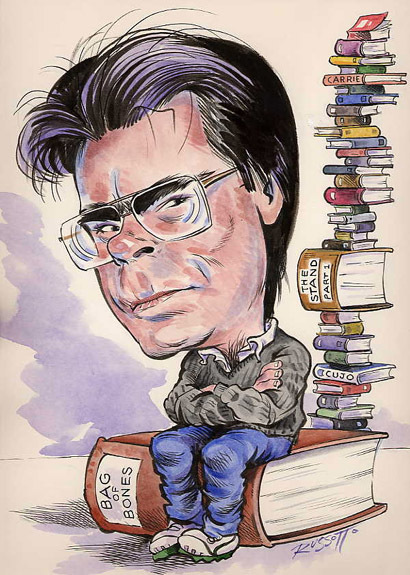Book review Tuesday: An ode to Stephen King
Quick note before I jump into the normal Tuesday book talk: I am so upset, like everyone else, by the Boston Marathon bombings. I lived in the Boston area for three years and love that city, even though its people can be a wee bit prickly – hey, that’s part of its charm. I feel blessed that none of my friends who still live in the Boston area were hurt in the bombings, but I know that a lot of other people weren’t so lucky. My heart hurts for everyone affected by the bombings, and for our country. I take some comfort in stories like this, about the kindness that springs out of tragedy. Hang in there, Boston.
Today’s book review is a salute to one of our greatest and yet most maligned authors, Stephen King. I never considered myself a real King fan until the past year or so, but now I take every opportunity to defend the guy when he is smeared by schmancy literary types. I think Stephen King’s a genius, and I don’t care who knows it.
I became a Stephen King fan after being exposed to his work by Al’s dad and step-mom, David and Ginger. They live in Bangor, Maine, the same little city where King lives in his grand — and perhaps slightly spooky looking — red house with white trim and spidery front gate.

Whenever Al and I are in Maine visiting family, I insist that we take a run or a walk past King’s house, first, because it’s awesome, and second, because I live in the hopes of catching a glimpse of the man himself.
David and Ginger also happen to be big Stephen King fans and have read most of his books (and there are a lot of them). I hadn’t read any of his books when I first started coming to Bangor, but I had seen a bunch of the movie adaptations: Carrie, The Shining, It, Misery, Dolores Claiborne. I remember for my birthday one year (I think it was my thirteenth) I had a sleepover with a bunch of girls during which we ate pizza, drank pop, and watched Carrie. My birthday is four days before Halloween and thus, I had some sort of “spooky” party nearly every year, so it seemed appropriate. Carrie, by the way, is an excellent — and SUPER scary — movie. That last scene? Holy mackerel. Gets me every time. *Shudders.* (By the way, they’re remaking Carrie and, to my surprise, it doesn’t look half bad).
Anyway, it wasn’t until Ginger gave me King’s 2000 book On Writing: A Memoir of the Craft that I began to really appreciate Stephen King. I read the book in early 2012, just as I was starting to eke out the rough ideas that would eventually become my first manuscript, and it was incredibly inspiring. On Writing is part memoir, part practical writing guide, and it includes a post-script discussing Stephen King’s horrific accident in 1999, when he was hit by a van while walking along a rural road in western Maine. Shortly after reading the book, in February 2012, I wrote this short review on Goodreads:
As someone who is about to embark on the slightly terrifying (but very exciting) journey to become a professional writer, I find King’s story immensely inspiring. His message is that to succeed in writing on a professional level, one must be persistent, dogged, and, to some extent, rigid. He insists on writing a minimum amount each day, for example, which is probably difficult on some days but has obviously worked to his advantage, considering how prolific he has been and continues to be. The book was also engaging because of King’s personal history: he writes about his struggles with alcoholism and his recovery from a near fatal car accident, but he also writes movingly about his relationship with his wife (who convinced him to get his draft of Carrie out of the trash can and give it another go) and reflects personally on some of his books. His writing advice tends toward the basic, in terms of grammar, structure, syntax, but the process-based advice is valuable. I especially like his perspective that stories exist in the universe and are waiting to be unearthed, and it is through the process of writing that we uncover them. Highly recommended for would-be writers and fans of King’s books.
Re-reading what I wrote then, it’s striking to me how much of King’s advice I have followed over the past year, and how helpful I’ve found it. For example, King writes a minimum of ten pages (or 2,000 words) a day when he is working on a novel. If it takes him an hour to do that, fine; if it takes him all day, fine. He explains:
On some days, those ten pages come easily; I’m up and out and doing errands by eleven-thirty in the morning, perky as a rat in liverwurst. More frequently, as I grow older, I find myself eating lunch at my desk and finishing the day’s work around one-thirty in the afternoon. Sometimes, when the words come hard, I’m still fiddling around at teatime. Either way is fine with me, but only under dire circumstances do I allow myself to shut down before I get my 2,000 words.
Since I started writing my first manuscript, I’ve followed King’s formula: 2,000 words per weekday, minimum. It’s worked like a charm. I started a second manuscript last week and so far I have almost 29,000 words written. Thank you, Mr. King, for the excellent advice.
King also stresses that to be a good writer, one must read a lot and write a lot. Check and check. I love that my compulsive, drinking-from-the-fire-hose-style reading — a former guilty pleasure — is now part of my job. And I love the way King discusses how reading helps us become better writers:
One learns most clearly what not to do by reading bad prose — one novel like Asteroid Miners (or Valley of the Dolls, Flowers in the Attic, and The Bridges of Madison County, to name just a few) is worth a semester at a good writing school, even with the superstar guest lecturers thrown in.
Good writing, on the other hand, teaches the learning writer about style, graceful narration, plot development the creation of believable characters, and truth-telling. A novel like The Grapes of Wrath may fill a new writer with feelings of despair and good old-fashioned jealousy — “I’ll never be able to write anything that good, not if I live to be a thousand” — but such feelings can also serve as a spur, goading the writer to work harder and aim higher. Being swept away by a combination of great story and great writing — of being flattened, in fact — is part of every writer’s necessary formation. You cannot hope to sweep someone else away by the force of your writing until it has been done to you.
Oh, I could go on and on about all of the utterly practical yet deeply inspiring advice in On Writing that has helped me so much over the past year, but I’ll let you read it for yourself. It’s a wonderful book.
After reading On Writing, I decided to delve into some of King’s fiction, and so over the last year I’ve read Bag of Bones (spooky but a bit long), The Dead Zone (a classic, also a bit long), and Salem’s Lot (creepy and, well, a bit long). Now I have The Shining sitting in my Kindle queue and I’m looking forward to reading it. Now, say what you will about King’s flaws — he’s long-winded, his dialogues can be cringe-worthy, why do all of his books have to involve a writer living in Maine?, his prose can be a tad clunky at times — but I dare anyone to argue that the man’s not a storytelling genius. Think of all the classic stories that came out of his brain, stories that are now so entrenched in popular culture that they’ve become truly iconic: Carrie, Cujo, Pet Sematary, Misery, The Shining, The Green Mile, Christine, Salem’s Lot, Needful Things, Thinner. I mean, you know you’ve made it when Family Guy does an episode parodying a movie based on one of your books, or Eminem works a reference into one of his songs (“I cannot grow old in ‘Salem’s Lot!”). Seriously – one dude, Stephen King, has come up with all of these stories. The mind boggles at the creativity.
As a writer, I feel indebted to King for his practical wisdom and for the admirable example he’s set: he’s prolific, he’s dedicated, he’s humble, and dang, he’s a unique thinker. I encourage you all to check out King’s work — starting with On Writing, if you’re at all inclined toward putting pen to paper (or fingers to keyboard) — and see what you think. I’ll leave you with some of King’s closing wisdom from that book:
Writing isn’t about making money, getting famous, getting dates, getting laid, or making friends. In the end, it’s about enriching the lives of those who will read your work, and enriching your own life, as well. It’s about getting up, getting well, and getting over. Getting happy, okay? Getting happy… Writing is magic, as much as the water of life as any other creative art. The water is free. So drink.
Drink and be filled up.


What a sad day yesterday was. I haven’t yet read 1963 (also by King) but my hubby says it is FABULOUS. And, on the plus side I started Wolf Hall and it is FABULOUS and addicting. Great recs Steph!
Yay! Glad to know my recs are hitting the mark. I have to check out 1963; that’s one of the ones I’ve passed over before because I didn’t know anything about it. Also want to read The Stand, which is supposedly his greatest work.
add “The Stand” to your list
Definitely will. I didn’t know you had read that, Ma.